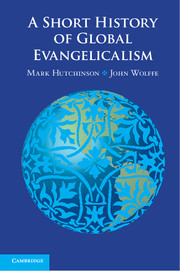Book contents
- Frontmatter
- Contents
- Figures
- Tables
- Preface
- Abbreviations
- 1 Understanding Evangelicalism
- 2 The ‘Surprising Work of God’: Origins to 1790s
- 3 Volunteering for the Kingdom: 1790s to 1840s
- 4 The Kingdom Enlarged and Contested: 1840s to 1870s
- 5 A New Global Spiritual Unity: 1870s to 1914
- 6 Fighting Wars and Engaging Modernity: 1900s to 1945
- 7 Towards Global Trans-Denominationalism: 1945 to 1970s
- 8 ‘The Actual Arithmetic’: A Survey of Contemporary Global Evangelicalism
- 9 Localism and Transnationality: 1970s to 2010
- 10 Conclusion
- Further Reading
- Index
- References
5 - A New Global Spiritual Unity: 1870s to 1914
Published online by Cambridge University Press: 05 June 2012
- Frontmatter
- Contents
- Figures
- Tables
- Preface
- Abbreviations
- 1 Understanding Evangelicalism
- 2 The ‘Surprising Work of God’: Origins to 1790s
- 3 Volunteering for the Kingdom: 1790s to 1840s
- 4 The Kingdom Enlarged and Contested: 1840s to 1870s
- 5 A New Global Spiritual Unity: 1870s to 1914
- 6 Fighting Wars and Engaging Modernity: 1900s to 1945
- 7 Towards Global Trans-Denominationalism: 1945 to 1970s
- 8 ‘The Actual Arithmetic’: A Survey of Contemporary Global Evangelicalism
- 9 Localism and Transnationality: 1970s to 2010
- 10 Conclusion
- Further Reading
- Index
- References
Summary
When the vigorous anti-Catholic controversialist Hugh McNeile died, the Times of London (31 January 1879) felt safe enough to overreach itself by writing not only his obituary, but the obituary of that ‘old Evangelicalism…whose influence has almost ceased to count in current controversies’. An evangelical champion, J.C. Ryle, soon to be Bishop of Liverpool, replied tartly to the effect that rumours of evangelicalism's death were greatly exaggerated, and driven by attempts to expunge the evangelical voice from Western public conversations. The exaggeration, however, carried force. The cost of Victorian-era success for evangelicalism was its popular association with all that made the age quotidian and bland. Having taught nations the lessons of the First Great Awakening and provided models for mobilising the mass voluntarist society, did it have anything further to give? Science and the stock market cast doubt on it. The world had once been explained in terms of ‘divine interventions’ (Newton) and the ‘invisible hand’ (Smith), but these new titans now seemed increasingly sufficient in themselves. In an age where nationalisms projected themselves as semi-religious totalities embracing both private conscience and political behaviour, evangelicals were pushed to reconsider the architecture of their faith, to search for a new unity of external practice and internal conviction.
It was in part a matter of where the observer stood. By the 1850s, evangelicals could stand on a proud history of reform (seen in legislation for individual conscience and working conditions), public welfare (seen in schools, hospitals and charitable institutions) and the restraint of evil (abolitionism). For all their iconic successes, however, the postmillennial dream of the kingdom built on earth had not come to pass. Indeed, to some degree it had been absorbed and bypassed by the confident expansion of national states which sought to wrap claims to ultimate authority in the language of religion. For Americans, the popular press promoted the idea of a ‘manifest destiny to overspread the continent allotted by Providence for the free development of our yearly multiplying millions’. While initially used to tidy up the American map, such claims were universalist at their base, and would be applied to global empire. On the other side of the Atlantic, British nationalist co-option of religion into the state progressed under the aegis of high imperialism towards disestablishment, Spencerian social Darwinism, public welfare and bureaucratization for imperial efficiency.
- Type
- Chapter
- Information
- A Short History of Global Evangelicalism , pp. 117 - 145Publisher: Cambridge University PressPrint publication year: 2012



